Issue:
July 2025 | Cover story
The FCCJ honors individuals and organizations in Japan and Asia for their commitment to freedom of the press
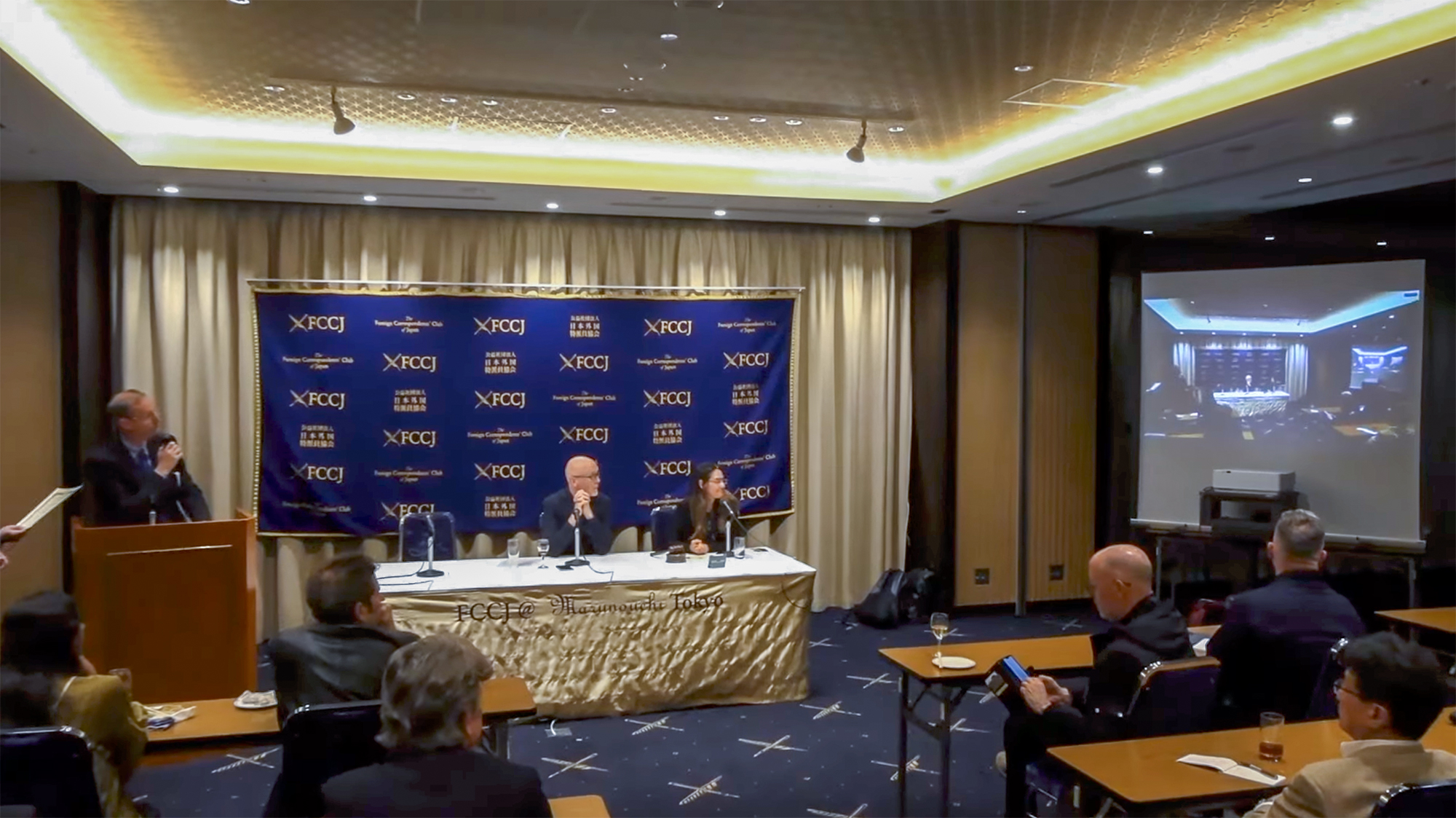
The FCCJ's Freedom of Press Committee recently presented its annual awards as part of the club's mission as a koeki shadan hōjin (public interest corporation) to foster and protect a free media. The club annually recognizes outstanding individual journalists and media organizations for their contributions to upholding the values of a free press in Japan and the wider Asia-Pacific region.
The awards are the highlight of FCCJ's efforts to promote free speech and the free exchange of information, which includes issuing statements to condemn particularly serious cases of censorship, harassment or unlawful detention, and inviting speakers to highlight such problems in Japan and Asia.
In his opening remarks, FCCJ President Dan Sloan cited a recent Committee to Protect Journalists report stating that more journalists had been killed in 2024 than at any time in the organization’s history. “[This year] doesn’t look like it’s going to be any safer or any better,” Sloan said. “Our mission here at the club is to shine a light and give recognition to those who are bringing important information and important storytelling to the world. You’ll find the winners tonight have all achieved that.”
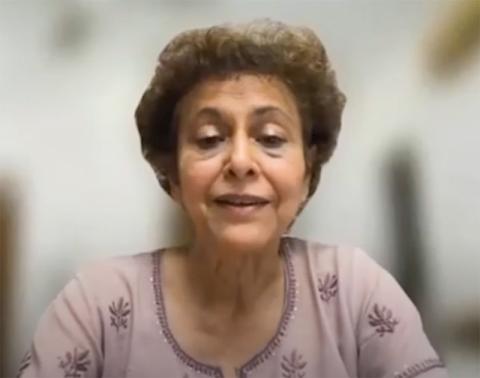
Irene Khan, the United Nations Special Rapporteur for Freedom of Expression and Opinion, said the FCCJ awards were a tribute “to the courage of those who speak the truth fearlessly to power to their commitment to expose wrongdoing no matter who commits it and the resilience to continue, despite personal and professional dangers cracks and challenges”.
In a pre-recorded keynote speech, Khan said: “Journalism has never been more vital than in these dangerous and destabilizing times, and in the face of growing authoritarianism and backsliding democracies. According to the International Federation of Journalists, in 2024 the Asia-Pacific was the second most dangerous region in the world for journalists, second only after the Middle East."
Khan said that 22 journalists had been killed across Asia last year, adding that “impunity for the killing of journalists persists as a black mark against national justice systems, but also as a reminder of the need for the international community, including the United Nations, to make the world a safer place for those who put their lives on the line so that we can benefit from the truth. Killing a journalist is the most egregious form of censorship. Unfortunately, it is not the only threat that journalists face."
Khan cited crackdowns on journalist in Myanmar, and in Hong Kong, where independent media had been “obliterated” in the name of national security.
“Even in liberal democracies, well developed legal systems are increasingly being used as a weapon by the rich and powerful to prosecute and litigate journalists on frivolous allegations and often false grounds for libel or other offenses, from national security to false claims of financial fraud and tax evasion,” she said.
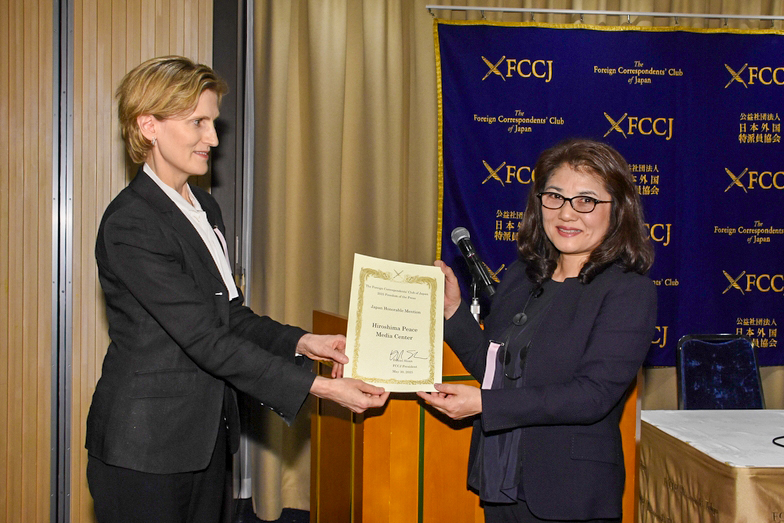
Isabel Reynolds, a former FCCJ president and Tokyo bureau chief of Bloomberg, presented the Japan Honorable Mention award to the Hiroshima Media Peace Center, established in 2008 by the Chugoku Shimbun. “Eight decades after Hiroshima and Nagasaki, the world seems as close as it ever was to another nuclear conflict, and that's why the committee felt it was important to honor these efforts to keep the reality of atomic weapons in the public's mind,” Reynolds said.
Accepting the award, Yumi Kanazaki, director of the center, said: “Eighty years ago, the Chugoku Shimbun lost 114 employees, nearly one-third of its staff, in the atomic bombing. The history of our newspaper has been with the hardship of recovering from the ashes. Our history has also been with the unbearable suffering and anger of atomic bomb survivors, the cries of those who lost their families, and their desperate plea that the horrors of the atomic bomb must never be repeated.”
She added: “Above all, it goes without saying that we owe a lot to number of our predecessors and colleagues who have written numerous number of quality articles.”
Noting that Japan Hidankyo, an organization of A-bomb survivors, had been awarded the 2024 Nobel peace prize, Kanazaki said: “The underlying recognition regarding the award is the growing awareness of the danger of nuclear weapons use.”
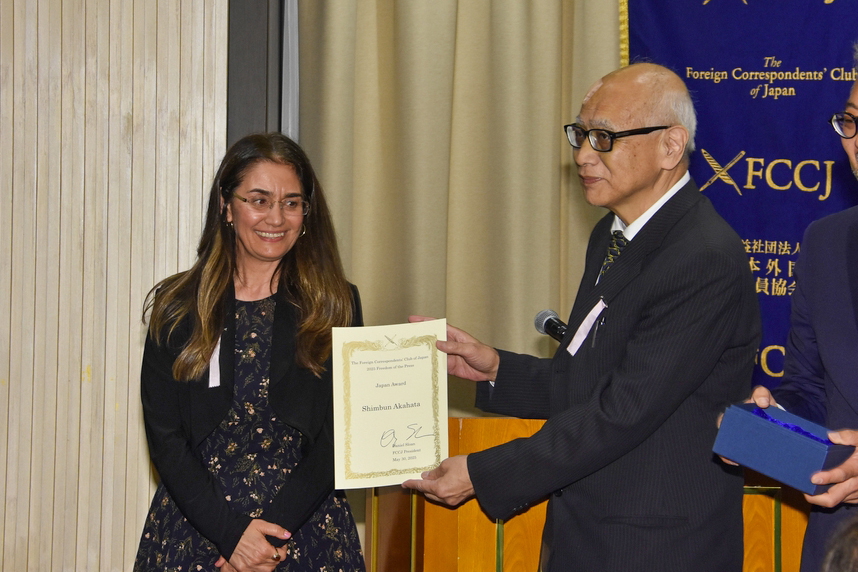
The Japan Award went to Shimbun Akahata, the official newspaper of the Japan Communist Party, for its groundbreaking reporting on a slush fund scandal inside the ruling Liberal Democratic Party (LDP).
Akahata’s scoop was followed up by Japan’s mainstream and foreign media, and has been credited with forcing the resignation last year of the then prime minister, Fumio Kishida, and the failure of the LDP and its junior coalition partner Komeito to hold on to their majority in last October’s lower house elections.
Ilgin Yorulmaz, co-chair of the Freedom of Press Committee, said the newspaper’s revelations “shook Japan's political establishment … despite being dismissed as a Japan Communist Party-affiliated daily publication”.
The newspaper, she added, “had demonstrated journalistic said journalistic integrity in holding the powerful accountable. Japan's mainstream media has long been hesitant to aggressively challenge the ruling party partly due to a reliance on exclusive press club access and a tendency towards self-censorship. Its work is testament to the vital role of independent watchdog journalism in Japan's democracy.”
Yoji Ogiso, editorial director of Shimbun Akahata, said the newspaper’s revelations about the LDP’s misuse of funds was a “historic scoop” that had brought the issue to the fore.
“I would like to discuss why the shock scoop was not in the mainstream media, but in a party newspaper,” he said. “The reasons for the awards point to the fact that Japan's mainstream media have long been hesitant to actively challenge the ruling party. This is precisely the factor that has led to the decline of Japan's press freedom ranking.”
In contrast, Ogiso said, Akahata is “free from taboos, and has no reservations or scruples about power. Akahata is a newspaper that tackles head-on the political distortions of the absolute U.S.-Japan alliance and the focus on the business world and big business. We also have journalists who share this awareness of the issues and continue to cover them diligently and steadily. This is how our power-monitoring scoops are reproduced. We are convinced that this is possible only because we are the official newspaper of the Japan Communist Party.”
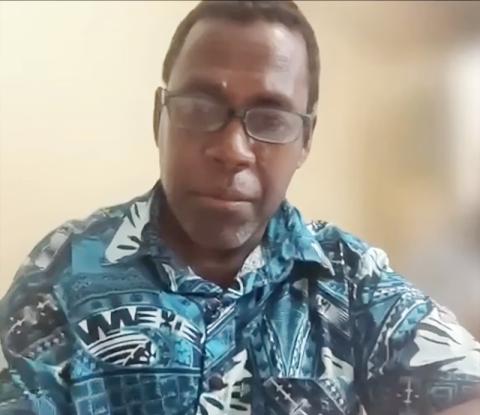
Awarding the small independent news outlet In-Depth Solomons the Asia Honorable Mention, Eric Johnston of the Japan Times commended its impressive record of scoops, having published six major investigative pieces in 2024 alone.
A series of reports about a corrupt prime minister led to his decision to not seek re-election last year - a remarkable achievement given that In-Depth Solomons was formed just two years ago. The outlet’s small crew of journalists “focus on stories other local media, including state-funded television media, downplay if not ignore”, Johnston said.
“With a population of around 700,000 scattered across thousands of islands, the Solomon Islands has long struggled with limited media resources and political pressures. But the founders of In-Depth Solomons set out to not only uncover official wrongdoing but also spark public conversations that would lead to meaningful change,” he added.
Accepting the award, editor Ofani Eremae said that being recognized by the FCCJ was “both humbling and deeply encouraging”. He added: “This recognition reminds us that courage, integrity and persistence still matter.”
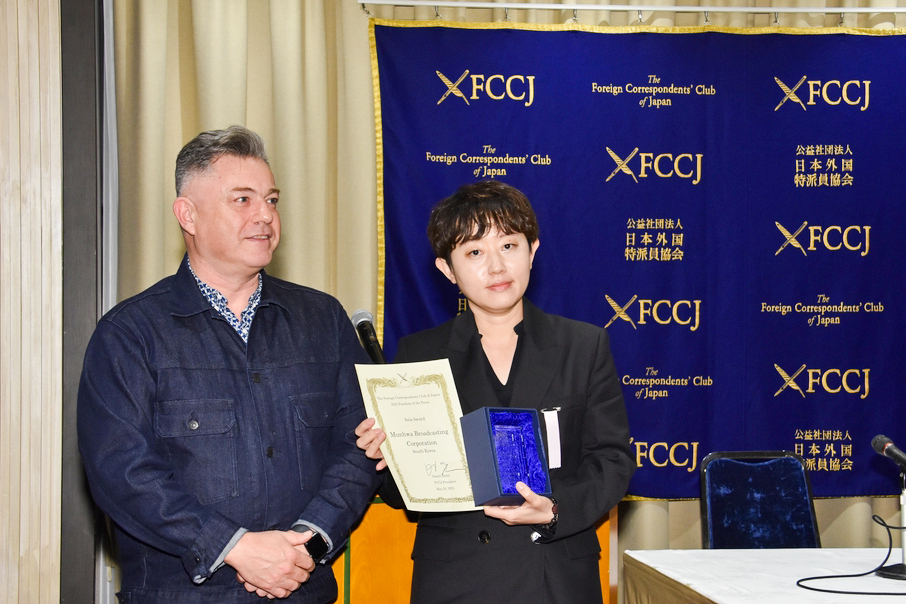
The Asia Award went to Munhwa Broadcasting Corporation (MBC), which came under intense fire during the political turmoil that gripped South Korea after disgraced President Yoon Suk Yeol declared martial law in December 2024. While the order was lifted a few hours later, Yoon’s attempted power grab had the media, as well as his political opponents, in its sights, and his supporters engaged in a campaign of sometimes violent intimidation for months afterwards.
When Yoon’s supporters broke into the Seoul Western District Court earlier this year, they targeted MBC journalists, assaulting them and stealing their equipment.
“MBC journalists repeatedly put themselves in harm’s way to tell their country’s most important story for decades,” said Justin McCurry, Japan and Korea correspondent for the Guardian. “They refused to be silenced by Yoon’s disastrous embrace of authoritarianism and later by angry and sometimes violence pro-Yoon supporters.”
Accepting the award on behalf of her colleagues, MBC’s Tokyo correspondent, Jiyoung Shin, said: “It was self-evident that Yoon would try to seize MBC by force. She added that this had left her and her colleagues with no option but to fight. “The power that journalists have does not belong to us – it belongs to the people. The same applies to the president.”
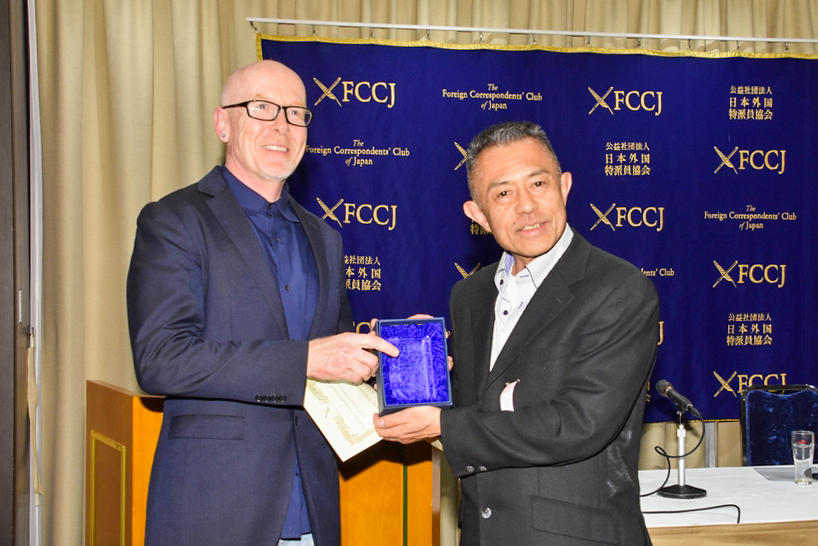
The committee’s lifetime achievement award went to Jiro Ishimaru, founder of Asia Press, a network of citizen journalists inside North Korea.
For nearly 30 years, Ishimaru has taken numerous risks to maintain the network, making reporting trips and traveling along the North’s entire border with China, where he liaises with reporters and colleagues, and interviewing hundreds of North Koreans inside and outside the hermit kingdom.
Asia Press has for many years been an invaluable source on everything from the inner workings of the Kim family to the lives of ordinary North Koreans.
“Its reports on a famously impenetrable country, which regularly polls near the bottom of most press-freedom rankings, are widely cited in the Western and Japanese media,” said David McNeill, the committee’s co-chair.
Accepting the award, Ishimaru expressed sadness that interest in North Korea had waned in the last few years amid a growing list of global horrors, including conflicts in Myanmar, Gaza and Ukraine.
“President Trump writes a single post on social media and becomes front page news,” he said. “It’s deeply frustrating.” But, he added, his organization still had 10 journalists inside North Korea and would continue reporting, despite the difficulties. “Today is the day when their work has been recognized.”
Link to YouTube video: https://www.youtube.com/watch?v=uIy5vu3-qNM&t=3277s
David McNeill is professor of communications and English at University of the Sacred Heart in Tokyo, and co-chair of the FCCJ’s Professional Activities Committee. He was previously a correspondent for the Independent, the Economist and the Chronicle of Higher Education.
Justin McCurry is Japan and Korea correspondent for the Guardian and the Observer. He is the author of War On Wheels: Inside Keirin and Japan’s Cycling Subculture (Pursuit Books, June 2021), published in Japanese as Keirin: Sharin no Ue no Samurai Wārudo (Hayakawa, July 2023).

